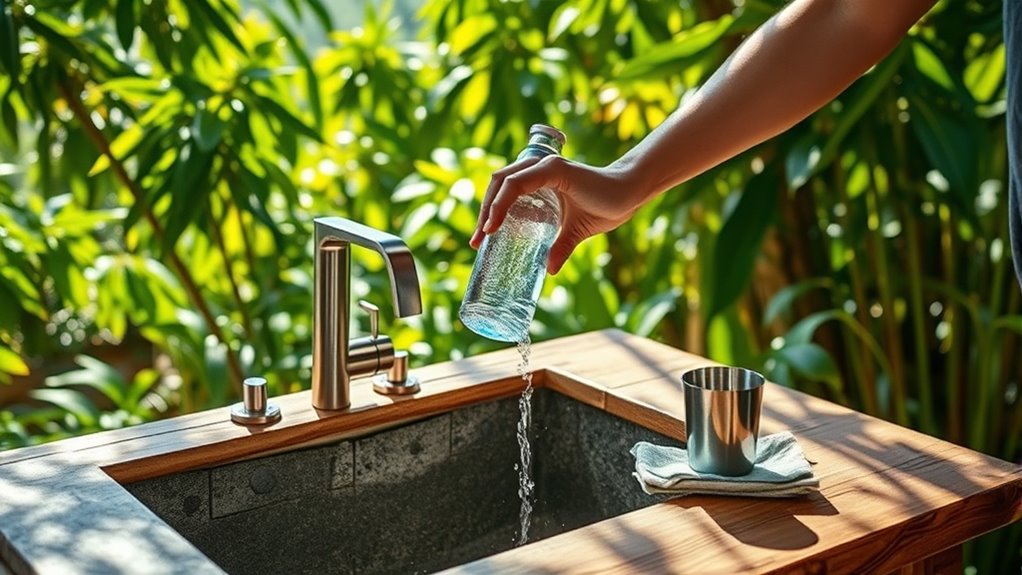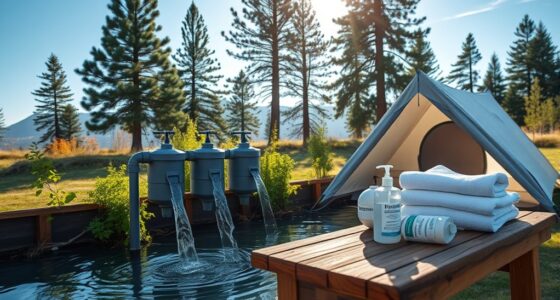To conserve water while traveling, opt for shorter showers and install water-saving devices like low-flow showerheads. Reuse towels and linens to cut down on laundry and always turn off taps when not in use. Pack reusable bottles and choose accommodations with water conservation initiatives. Use eco-friendly outdoor gear and be mindful during water-related activities. Supporting local water efforts and eco-friendly tours can make a big difference—keep exploring to learn more tips.
Key Takeaways
- Use water-efficient gear like low-flow showerheads, portable filters, and reusable bottles to minimize water use during travel.
- Take shorter showers, turn off taps when not in use, and reuse linens to conserve water daily.
- Support eco-friendly accommodations and businesses practicing water-saving technologies like rainwater harvesting.
- Participate in local water conservation initiatives and choose sustainable, water-conscious tours and transportation.
- Pack multi-purpose, water-saving outdoor gear and adopt responsible water habits to reduce your overall water footprint.
Opt for Shorter Showers and Use Water-Saving Devices

Taking shorter showers can substantially reduce your water usage while traveling. You control your shower duration, so aim to keep it brief — even a few minutes less makes a difference. Installing water-saving fixtures, like low-flow showerheads, can drastically cut water consumption without sacrificing comfort. These fixtures are designed to maintain adequate pressure while using less water, making your shower eco-friendly and efficient. Being mindful of your shower duration and choosing the right water-saving devices will enhance your environmental impact, helping you conserve essential resources. Remember, small changes in your daily routine, such as limiting shower time and upgrading fixtures, can lead to significant water savings during your trip. It’s a simple step toward responsible travel.
Reuse Towels and Linens During Your Stay

Reusing towels and linens during your stay is an easy way to save water and reduce laundry loads. Linen reuse involves hanging up your sheets or bed linens if they don’t appear dirty, encouraging the hotel to skip washing them daily. Towel reuse allows you to hang towels after use instead of replacing them each day. By participating in linen reuse programs, you help conserve water used in laundry and reduce energy consumption. Many hotels provide signs or reminders to support this effort, so take advantage of these options. Not only does linen reuse lessen your environmental impact, but it also promotes sustainable travel habits. Small actions like these make a significant difference in conserving water during your trip, especially when considering the broader water conservation efforts emphasized in environmental practices.
Turn Off Faucets When Not in Use
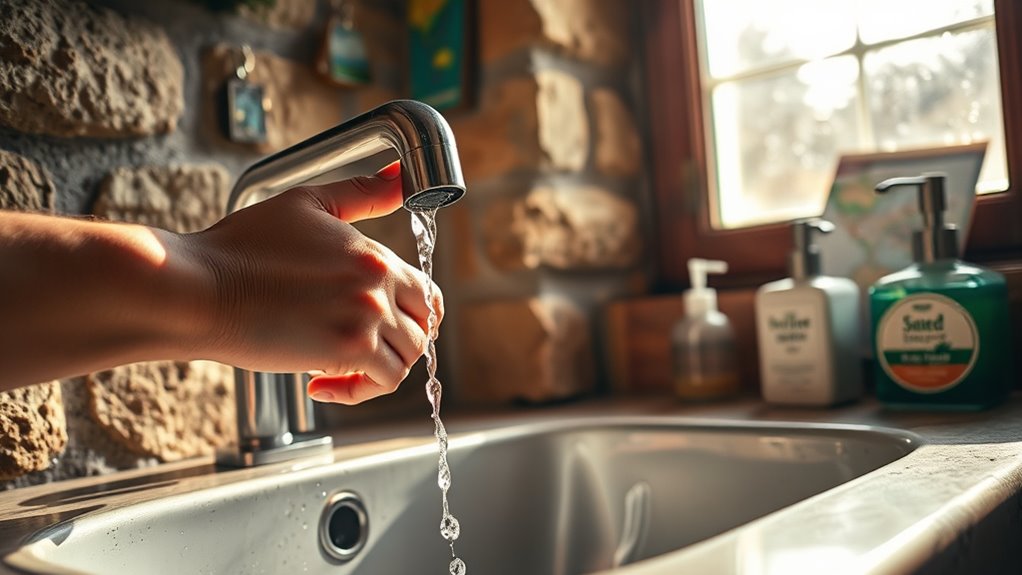
Turning off faucets when they’re not actively in use is one of the simplest and most effective ways to conserve water during your travels. Proper faucet maintenance ensures they function smoothly, preventing leaks that waste water. Always check for drips or leaks and report them to hotel staff or fix minor issues if possible. Practice water flow control by turning the faucet off completely when brushing your teeth or washing your hands, instead of leaving it running. This small habit considerably reduces water wastage. Be mindful of how long you keep taps running, especially in public restrooms. By controlling water flow and maintaining faucets, you help conserve water and reduce your environmental impact during your trip. Simple actions like these make a big difference. Materials influence artistic expression, and choosing sustainable options can further enhance your eco-friendly habits.
Pack Eco-Friendly and Refillable Water Bottles
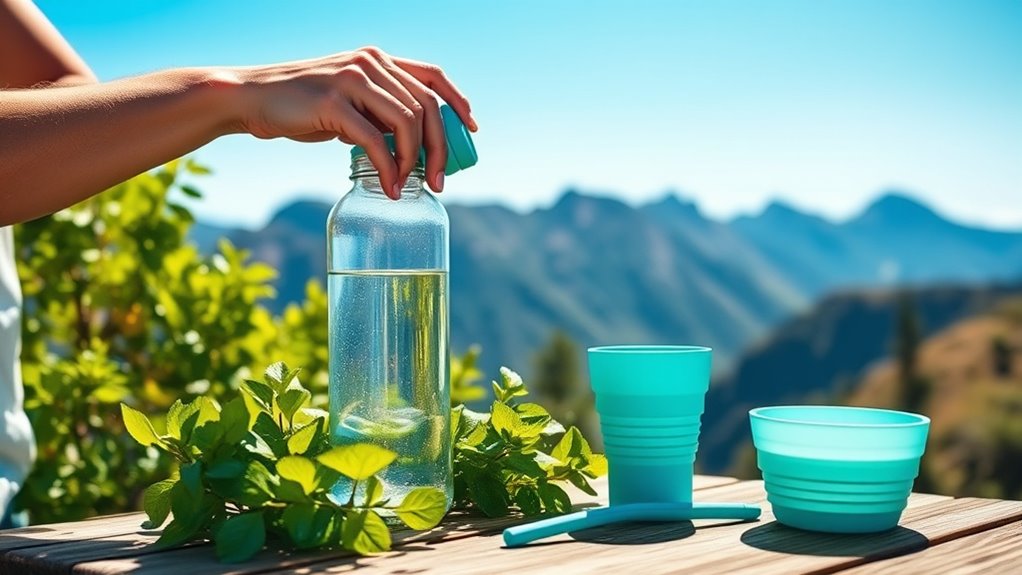
When you pack an eco-friendly and refillable water bottle, you directly reduce single-use plastic waste and cut down on the environmental impact of bottled water. Reusable bottles are a simple yet effective way to practice eco friendly hydration during your travels. By choosing durable, BPA-free bottles, you guarantee safe drinking while minimizing waste. Carrying your own bottle means you can refill whenever water is available, saving money and reducing plastic pollution. Opt for lightweight, compact designs that fit easily in your bag or backpack. Not only does this help conserve resources, but it also encourages mindful hydration habits. Making this small change supports environmental sustainability and keeps you well-hydrated without relying on disposable plastic bottles.
Choose Accommodation With Water Conservation Initiatives
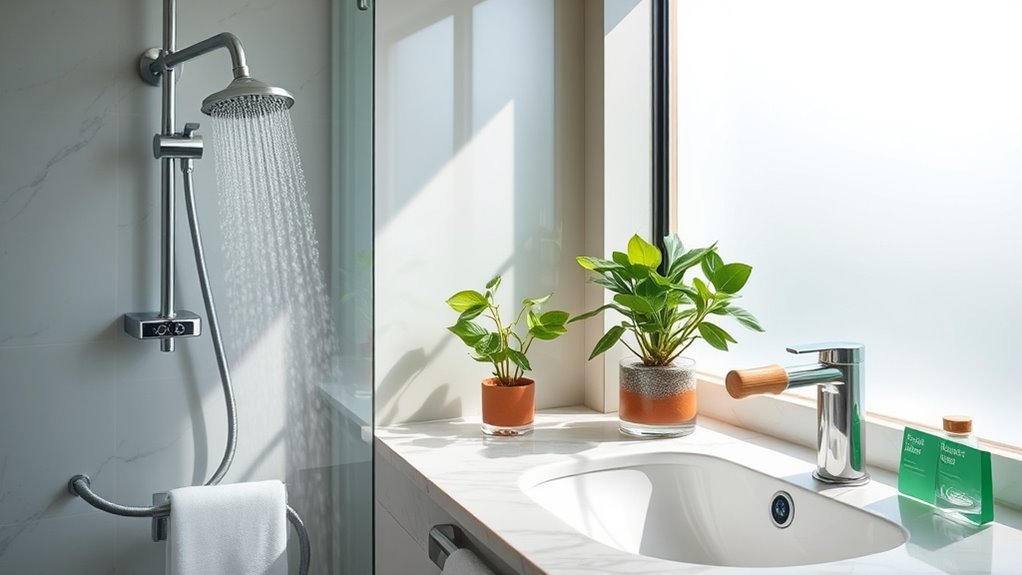
Opting for accommodations that prioritize water conservation can considerably reduce your environmental impact while traveling. Look for places that use water-efficient appliances, such as low-flow toilets and energy-saving washing machines. Water-saving fixtures like aerated showerheads and faucet aerators help minimize water use without sacrificing comfort. Many eco-friendly hotels also implement greywater recycling systems and rainwater harvesting to reduce their reliance on local water sources. Incorporating wall organization systems in hotel rooms can also promote better water management and cleanliness. By choosing such accommodations, you support sustainability efforts and contribute to conserving essential water resources. Before booking, check the property’s sustainability policies or ask about their water conservation initiatives. Staying at places committed to water efficiency not only benefits the environment but also enhances your travel experience by aligning with eco-conscious values.
Use Water-Efficient Camping and Outdoor Gear

You can save water by choosing low-flow equipment and water-saving designs for your outdoor gear. Packing compact, efficient gear also helps reduce your overall water footprint. These simple swaps make your camping trips more eco-friendly and sustainable. Incorporating water-efficient gear can further enhance your conservation efforts during outdoor adventures.
Choose Low-Flow Equipment
Choosing water-efficient camping and outdoor gear can considerably reduce your water consumption while traveling. Start by selecting low flow faucets, which use less water without sacrificing performance. Installing water saving showerheads is another simple way to cut down on water use during your showers. These devices maintain good water pressure while limiting flow, helping you conserve water effortlessly. Look for gear labeled as water-efficient or designed specifically for outdoor use, such as portable sinks or spray nozzles that reduce flow rates. By choosing low-flow options, you can enjoy your trip without wasting precious water resources. Incorporating water conservation techniques into your planning can make your outdoor adventures more sustainable and eco-friendly. Small changes like these can make a big impact on water conservation during your travels.
Opt for Water-Saving Designs
By selecting water-efficient camping and outdoor gear, travelers can markedly reduce their water footprint without sacrificing convenience. Using gear designed for water savings, such as portable rainwater harvesting systems or greywater recycling setups, helps conserve essential resources. These systems allow you to reuse water for cleaning or irrigation, minimizing waste. Look for collapsible water bottles, low-flow showerheads, and portable filtration units to optimize efficiency. Additionally, consider gear that supports greywater recycling, enabling you to reuse wastewater responsibly. Portable rain barrels can collect rainwater for outdoor use, reducing reliance on external supplies. Choosing gear with these features ensures you stay eco-friendly while enjoying your adventure. Small changes in gear choices make a big difference in water conservation efforts during your travels. Incorporating water-saving features in your outdoor gear is an effective way to enhance conservation efforts.
Pack Compact, Efficient Gear
Packing compact, water-efficient gear guarantees you can stay prepared without unnecessary weight or bulk, making it easier to conserve water on your trip. Focus on compact packing by choosing multi-purpose items that serve multiple functions, reducing the need for extra gear. Invest in gear efficiency, like lightweight, water-saving camping tools and collapsible containers, which minimize water use and storage space. Look for camping gear designed to maximize water savings, such as low-flow showerheads or portable water filters. By selecting high-quality, efficient equipment, you’ll streamline your packing and reduce water waste. Additionally, understanding self-watering plant pots can inspire you to select eco-friendly, water-saving solutions for your outdoor needs. This approach not only lightens your load but also promotes responsible water use throughout your adventure, ensuring you stay comfortable while conserving this essential resource.
Be Mindful of Water Usage During Activities
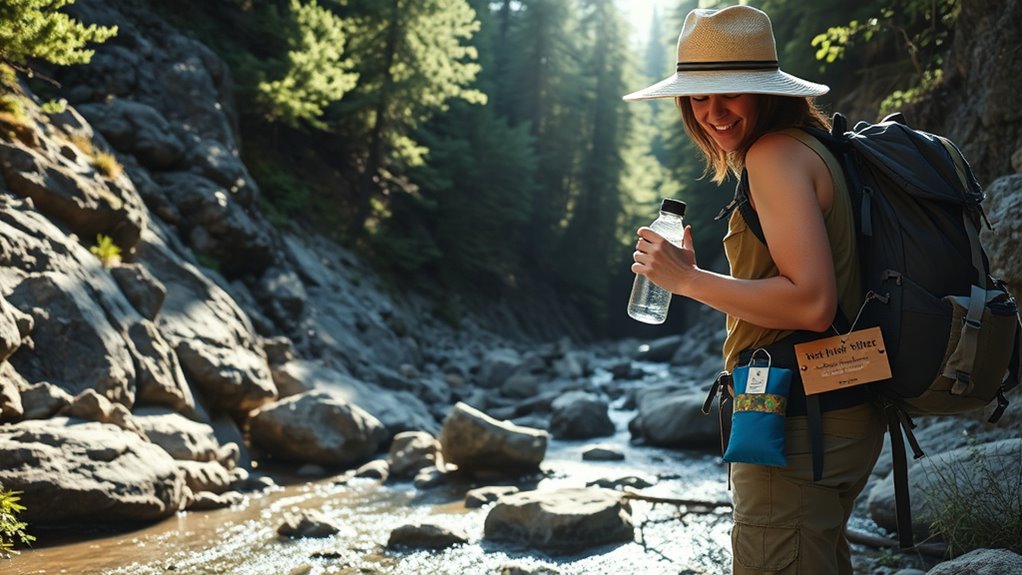
As you enjoy activities during your travels, staying mindful of your water use can make a big difference. Your water footprint increases with activities like showering, washing dishes, or snorkeling. To reduce your impact, practice water footprinting by being conscious of how much water each activity consumes. Small changes can add up, helping conserve precious resources. For example, choosing accommodations with water-saving fixtures can significantly reduce water use during your stay.
- Take quick showers instead of baths
- Use biodegradable soap to minimize contamination
- Reuse towels and linens when possible
- Avoid leaving taps running during activities
- Choose eco-friendly activities that prioritize water conservation
Support Local Water Conservation Efforts and Practices
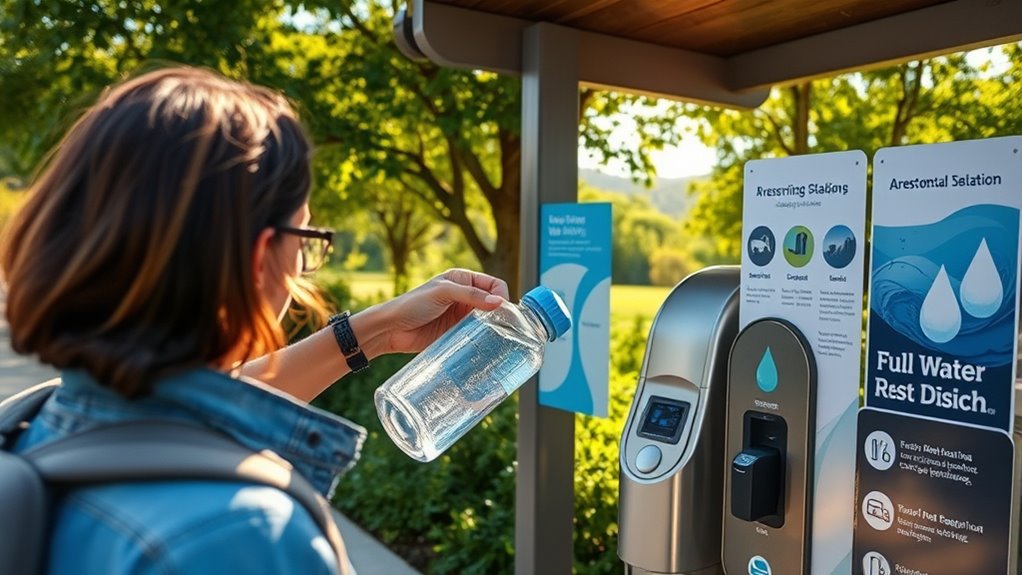
You can make a difference by choosing eco-friendly tours and supporting water-conscious businesses during your travels. Participating in local water conservation initiatives also shows your commitment to preserving resources. Every small action helps, so find ways to get involved and promote sustainable practices wherever you go. Incorporating water-saving strategies into your travel routine can further enhance your positive impact.
Choose Eco-Friendly Tours
Choosing eco-friendly tours is a smart way to support local water conservation efforts while exploring new destinations. By selecting tours that prioritize sustainable transportation, you reduce water usage and minimize environmental impact. Look for operators that use eco-friendly transportation options like electric boats or bicycles, which help conserve water resources. Opt for tours that promote responsible practices, such as avoiding wasteful activities and encouraging the purchase of eco-friendly souvenirs. Supporting local guides and businesses ensures your tourism dollars benefit water conservation projects directly. Additionally, choose tours that educate travelers about water issues and conservation strategies, empowering you to make more sustainable choices. With these efforts, you’ll enjoy meaningful experiences that protect water resources for future travelers.
Patronize Water-Conscious Businesses
Supporting local water conservation efforts is easier when you patronize businesses that prioritize sustainable water practices. By choosing hotels, restaurants, and shops committed to water saving tips, you help promote sustainable tourism. Look for establishments that use low-flow fixtures, recycle greywater, or implement water-efficient landscaping. Your patronage signals demand for responsible water use, encouraging others to follow suit. When traveling, ask about their water conservation policies or certifications. Small actions like choosing eco-conscious businesses can have a big impact, conserving precious water resources in the community. Supporting these businesses not only benefits the environment but also fosters a culture of sustainability. Your choices matter—by consciously supporting water-conscious businesses, you contribute to long-term water conservation efforts while enjoying your trip.
Participate in Local Initiatives
Ever wondered how your participation can directly impact local water conservation efforts? By engaging in community initiatives, you boost community awareness and support conservation advocacy. Your involvement encourages others to act and helps create sustainable change. You can:
- Join local water conservation workshops
- Volunteer with community clean-up events
- Promote water-saving practices on social media
- Attend town hall meetings focused on water issues
- Support organizations dedicated to water sustainability
Participating in these efforts amplifies conservation awareness and fosters a collective responsibility. Your active role not only helps protect crucial water resources but also inspires others to contribute. Small actions, when combined, make a significant difference in promoting sustainable water use within your community.
Frequently Asked Questions
How Can I Identify Accommodations That Prioritize Water Conservation?
To find accommodations that prioritize water conservation, look for places with water-efficient fixtures like low-flow toilets and showerheads. Check if they participate in eco certification programs, which often highlight sustainable practices. You can also ask directly about their water-saving initiatives. These steps help you choose eco-friendly options that reduce water use, making your travel more sustainable while ensuring comfort.
Are There Eco-Friendly Alternatives to Disposable Water Bottles for Travelers?
Imagine your thirst as a clear mountain stream, eager for sustainable pathways. You can quench it with reusable bottles filled with water filtration systems, turning every sip into an eco-friendly act. Instead of disposable bottles, carry a durable, refillable container that supports water conservation. This simple switch keeps plastics out of oceans and guarantees you stay hydrated, all while reducing your environmental footprint and embracing responsible travel.
What Are Some Water-Saving Tips for Outdoor Adventures and Activities?
When you’re on outdoor adventures, you can save water by utilizing natural water sources like streams or lakes, but always treat the water before use. Rainwater harvesting is also a great method; set up a portable collection system to gather rainwater safely. Remember to carry a reusable bottle and avoid unnecessary washing to conserve water. These tips help you stay eco-friendly while enjoying your outdoor activities.
How Can Travelers Support Local Water Conservation Projects Effectively?
You can support local water conservation projects by actively engaging in community involvement and volunteering your time. Consider participating in or organizing fundraising strategies like charity runs or online campaigns to raise awareness and funds. Educate yourself and others about water issues, spreading the message to inspire more support. Your efforts help build sustainable change, making a real difference in conserving water resources for the community and future generations.
What Are the Benefits of Using Water-Efficient Camping Gear?
They say, “A stitch in time saves nine,” and that’s true for gear selection. Using water-efficient camping gear offers a benefits overview: you’ll conserve water, reduce waste, and save money. It’s eco-friendly and guarantees you have enough water for your needs. Choosing the right gear makes a big difference, helping you travel sustainably while enjoying your trip without stressing about water waste. Plus, you set a positive example for others.
Conclusion
Just like a drop in the ocean can shape the entire sea, your small water-saving actions make a big difference. Every mindful choice, from shorter showers to supporting eco-friendly hotels, adds up. Remember, if each traveler acts responsibly, we can preserve this precious resource for future generations—much like Athena’s wisdom, your efforts can safeguard our planet’s water. Embrace these hacks and be a hero for water conservation wherever you go.

